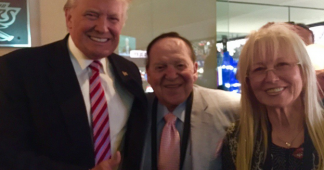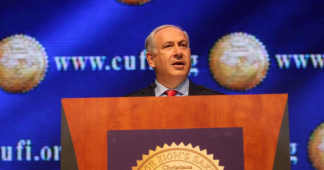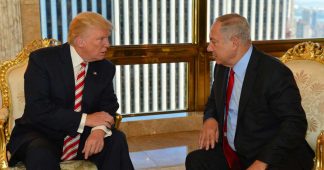By Philip Weiss
One pleasurable surprise of the AIPAC policy conference in early March — the leading Israel lobby group, the American Israel Public Affairs Committee — was how much bad press the organization got. It’s becoming almost fashionable to criticize the lobby for its enforcement of lockstep political support for Israel in Washington, and for its Soviet-style policy on access to the press.
These criticisms are finally showing up in the mainstream press. Reporters have been licensed by the injury mere high school students have done to another powerful lobby, the National Rifle Association. So maybe AIPAC is on the same path-to-pariah status, more than a decade after Walt and Mearsheimer published their book The Israel Lobby.
Here are a few items. Notable among them is a report in the Washington Post of all places saying that AIPAC was born to rally American Jews to stand shoulder to shoulder behind Israeli “lies” about a massacre of Palestinians, back in 1953. And two angry pieces in the Jewish press decrying AIPAC’s blackout policy on coverage of its gatherings.
First off, Gershon Baskin reports in the Jerusalem Post that a Maryland insurgent Democrat, Dr. Jerome Segal, is taking on Senator Ben Cardin, who voted against the Iran deal, because he is so pro-AIPAC. Baskin paints AIPAC as the NRA.
An interesting aspect of [Jerome] Segal’s candidacy is not only that he is challenging Senator Cardin, but that he is taking on AIPAC. Cardin is a kind of AIPAC “poster boy,” not only representing what AIPAC wants, but being on the front line of acting on behalf of AIPAC in the Senate. Segal believes that he will take the votes that supported Bernie Sanders (35% of the Democratic voters) and gain many other votes because the broad flow of American Jewish opinion is toward his Jewish Peace Lobby’s ideas and away from AIPAC’s blind support of Israel….
Segal presents himself as David to Cardin and AIPAC’s Goliath. Segal’s slogan is “if we beat AIPAC in Maryland, we can beat the NRA [National Rifle Association] in America.”..
Baskin is frank about AIPAC’s power (though he says, mistakenly imho, that the NRA is more powerful (Dems run against the NRA)):
Many members of Congress are simply afraid to ever challenge AIPAC, not because AIPAC puts so much money in the campaigns of everyone it supports, but because AIPAC’s strategy is also to target candidates that it doesn’t like and put huge amounts of money into their challengers’ campaigns. The candidates that AIPAC wants out usually don’t stand a chance.
And AIPAC is vulnerable because it has become the Trump lobby.
The AIPAC show of last week does not reflect the majority view of American Jewry. I believe that most of the thousands of participants at AIPAC were in fact Trump supporters.
Peter Beinart also says AIPAC is vulnerable, in a piece at the Atlantic site saying that AIPAC faces a “struggle to avoid the fate of the NRA.” Beinart says young Dems are alienated by AIPAC’s achievement: blocking criticism of the occupation. While rightwing Republicans are alienated by its lip service to the two-state solution.
AIPAC is conducting a remarkable experiment. It’s doubling down on bipartisanship and ideological diversity even as tectonic shifts in American politics and culture make that harder and harder…
It’s fascinating to watch, and it’s likely to fail…. It will fail because the thing about Israel that young liberals admire least is its half-century long policy of denying Palestinians in the West Bank basic rights like free movement, due process, and citizenship in the country in which they live—and entrenching that denial by building settlements where Jews enjoy rights that their Palestinian neighbors are denied. [AIPAC CEO Howard] Kohr’s endorsement of the two-state solution notwithstanding, AIPAC remains the most powerful force in American politics opposing pressure on Israel to end the occupation. Thus, young liberals can only embrace AIPAC if they place their support for Israel ahead of their opposition to its occupation.
There’s more of the NRA theme at Truthdig. Maj. Danny Sjursen, a former West Point instructor, laments on the death of the antiwar Democratic liberal congressperson, and rightly sees the lobby’s role in that transformation.
I nearly spit up my food the other day. Watching on C-SPAN as Sen. Amy Klobuchar, D-Minn., gleefully attended a panel at the American Israeli Public Affairs Committee (AIPAC) conference, I couldn’t help but wonder what has happened to the Democratic Party. The worst part is I like her, mostly. Look, I agree with Sen. Klobuchar on most domestic issues: health care, taxes and more. But she—a supposed liberal—and her mainstream Democratic colleagues are complicit in the perpetuation of America’s warfare state and neo-imperial interventionism. Sen. Klobuchar and other Democrats’ reflexive support for Israel is but a symptom of a larger disease in the party—tacit militarism.
AIPAC is a lobbying clique almost as savvy and definitely as effective as the NRA. Its meetings—well attended by mainstream Democrats and Republicans alike—serve as little more than an opportunity for Washington pols to kiss Benjamin Netanyahu’s ring and swear fealty to Israel. Most of the time, participants don’t dare utter the word “Palestinian.” That’d be untoward—Palestinians are the unacknowledged elephants in the room.
Sjursen laments Israel’s shadow over the U.S. image in the world.
The far right-wing Israeli government of Netanyahu, who is little more than a co-conspirator and enabler for America’s failed project in the Middle East, should be the last group “liberals” pander to…. For 50 years now, the Israeli military has divided, occupied and enabled the illegal settlement of sovereign Palestinian territory, keeping Arabs in limbo without citizenship or meaningful civil rights.
This is, so far as international law is concerned, a war crime. As such, unflinching American support for Israeli policy irreversibly damages the U.S. military’s reputation on the “Arab street.” I’ve seen it firsthand. In Iraq and Afghanistan, hundreds and thousands of miles away from Jerusalem, captured prisoners and hospitable families alike constantly pointed to unfettered U.S. support for Israel and the plight of Palestinians when answering that naive and ubiquitous American question: “Why do they hate us?”
Speaking of war crimes, The Washington Post published an important piece on “The dark roots” of AIPAC, by Doug Rossinow, a teacher of history at the University of Oslo. Rossinow says that AIPAC has its origins in the 1953 effort by American Jews to explain away a massacre of Palestinians.
Rossinow describes AIPAC as “a huge factor in U.S. policy” and endorses Gideon Levy’s picture of the group as a “Jewish lobby” — it “welded a united front of American Jews in support of Israel, a unity that politicians have had to respect.”
The original leader of the lobby group, I.L. “Si” Kenen, found most of his political friends among liberal Democrats, Rossinow writes. Truman had of course endorsed the Jewish state, pushed by major Zionist donors; but Eisenhower bucked Israel on several occasions, including during the famous Qibya massacre in the West Bank in 1953 — when Ariel Sharon’s troops killed “more than 60 civilians indiscriminately in retaliation for the murder of a Jewish woman and her two children in Israel.”
Back then, Israel didn’t get away with human rights violations.
The outcry was sharp and wide.
Time magazine carried a shocking account of deliberate, even casual mass murder by Israeli soldiers at Qibya — “slouching . . . smoking and joking.” The New York Times ran extensive excerpts from a U.N. commission that refuted Israeli lies about the incident.
Qibya was the genesis of AIPAC, Rossinow asserts, as Israel supporters prepared “for any future shocks coming out of Israel.”
Aware Israel’s reputation in the United States had been tarnished, American Jewish supporters of Israel scrambled to mount a damage-control effort in late 1953 and early 1954.
And Jewish solidarity was key. Stalinist orthodoxy needed to be enforced. AIPAC’s predecessor did what the lobby does today, redlines the Jewish community (and even Americans for Peace Now marches along with its mouth shut).
It showed that there was nothing Israel might do that would jeopardize American Jewish support. Indeed, to some in the Jewish community, the more disturbing Israeli behavior was, the more Israel needed their ardent advocacy….
The perception that AIPAC represents a consensus among American Jews has always been a key to its political influence, which explains the group’s sometimes seemingly outsized opposition to Jewish dissent from its line. “America’s Pro-Israel Lobby,” born in awful knowledge, has always existed to make Israeli realities and priorities palatable to Americans.
The worse things got, the louder were the Jewish voices. Denying “awful knowledge.” Imagine, that was in the Washington Post!
More dissent. The editors of the Jewish Week, angered by AIPAC’s stiffnecked policy on the press attending the most interesting sessions at the policy conference, refused to attend the conference. From “Why We Won’t Be at the AIPAC conference.”
Lobby leaders said that speakers and panelists at the conference may feel inhibited in expressing their views if members of the press were in the room. We countered that a conference with 20,000 attendees, and dozens of sessions with many hundreds of delegates, is by nature not conducive to keeping secrets, especially in the age of instant tweets and texts. If members of the press agreed to the ground rules of attending “off the record” sessions, it would allow the media to get a sense of the important give-and-take that takes place in these informative sessions without violating journalistic or AIPAC boundaries….
AIPAC has a long history of being wary of and less than friendly toward the press. Members of the press enter the AIPAC convention through a separate entrance and must be accompanied by staff to proceed to the main area where sessions are held — and even accompanied to the rest rooms at times. Such treatment doesn’t foster trust and mutual respect. AIPAC officials say the press is overly critical in its coverage of the lobby….
The editors also say that Israel is under fire, and so “AIPAC’s mandate of promoting bipartisan support for Israel is more vital than ever.” But the press policies are hurting that goal.
The Atlanta Jewish Times chimes in, deploring AIPAC’s policy and saying it was unable to cover an AIPAC gathering in Atlanta because it was off the record.
The perfect image of AIPAC’s wrongheaded attitude emerged Sunday, March 4, the first day of the Washington conference. Outside a session titled “Free Speech and Freedom of the Press in Israel” was this sign: “THIS SESSION IS OFF THE RECORD AND CLOSED TO THE PRESS.”
…AIPAC recently held its annual Atlanta community event at Mercedes-Benz Stadium with Pulitzer Prize-winning columnist Bret Stephens of The New York Times speaking. But you didn’t see any coverage in the AJT because everything AIPAC does locally is off the record.
It’s particularly aggravating when the speaker is a fellow member of the press, such as Stephens…
We suspect AIPAC just likes to maintain a sense of mystery that brings an aura of power and perhaps increases people’s desire to pay to see what’s inside.
In sum, the atmosphere is changing for AIPAC. People are more willing to criticize it in the press. A sea change in establishment attitudes is under way, I believe, though it will take a while…
Thanks to Donald Johnson, Todd Pierce, Adam Horowitz, John Whitbeck.











